South River Water Trail Pushing Forward Despite Helene Setback
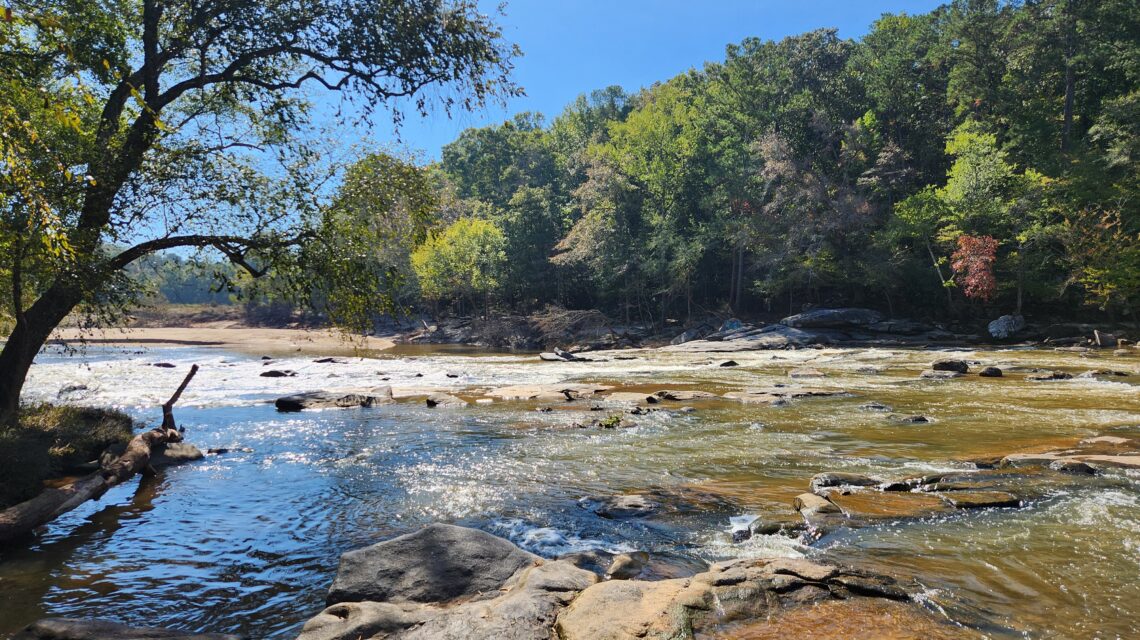
Last September, Hurricane Helene devastated large swathes of the South, and the South River Water Trail was hit especially hard. A year later, we take a look at the recovery of the Heritage Area’s primary waterway.
Around this time last year, the South River Watershed Alliance had three new kayak launches across three parks in DeKalb and Rockdale Counties at Panola Shoals, Lorraine Park and Trailhead, and River’s Bend Park. This chain of put-ins and takeouts was primed to be the backbone, the start, of the South River Water Trail, a system of trails and launches to take recreationists down one of Atlanta’s primary waterways. The goal was for this river trail to one day rival the Chattahoochee River National Recreation Area, currently the only place to paddle in Metro Atlanta. Then Hurricane Helene hit.
A Hellacious Hurricane
“That was a hundred-year flood with Helene,” said Dr. Jaqueline “Jackie” Echols, founder of the South River Watershed Alliance (SRWA). “It required a lot of reassessment about our launch points.”

Dr. Echols, Board President of the South River Watershed Alliance, has held a decades-long battle with local governments to improve water quality and encourage more water recreation on the River.
For the last two decades, the South River Watershed Alliance has been leading the advocacy push to protect the South River with the persistent Dr. Echols at the helm, now serving as the small nonprofit’s Board President and working pro bono all these years. Dr. Echols was blown away by Helene’s flood waters, which, according to the United States Geological Survey gauge, rose to at least 17 feet at Lorraine Park. The storm surge changed the river’s shoreline, erasing the sandbar at River’s Bend (where the paddle put-in used to be) and completely destroying the launch at Lorraine Park as well as flooding the park. The greatest damage, however, was at Panola Shoals Trailhead, one of the most picturesque stretches of river, which has been closed much of the last year because of the effects of the storm.
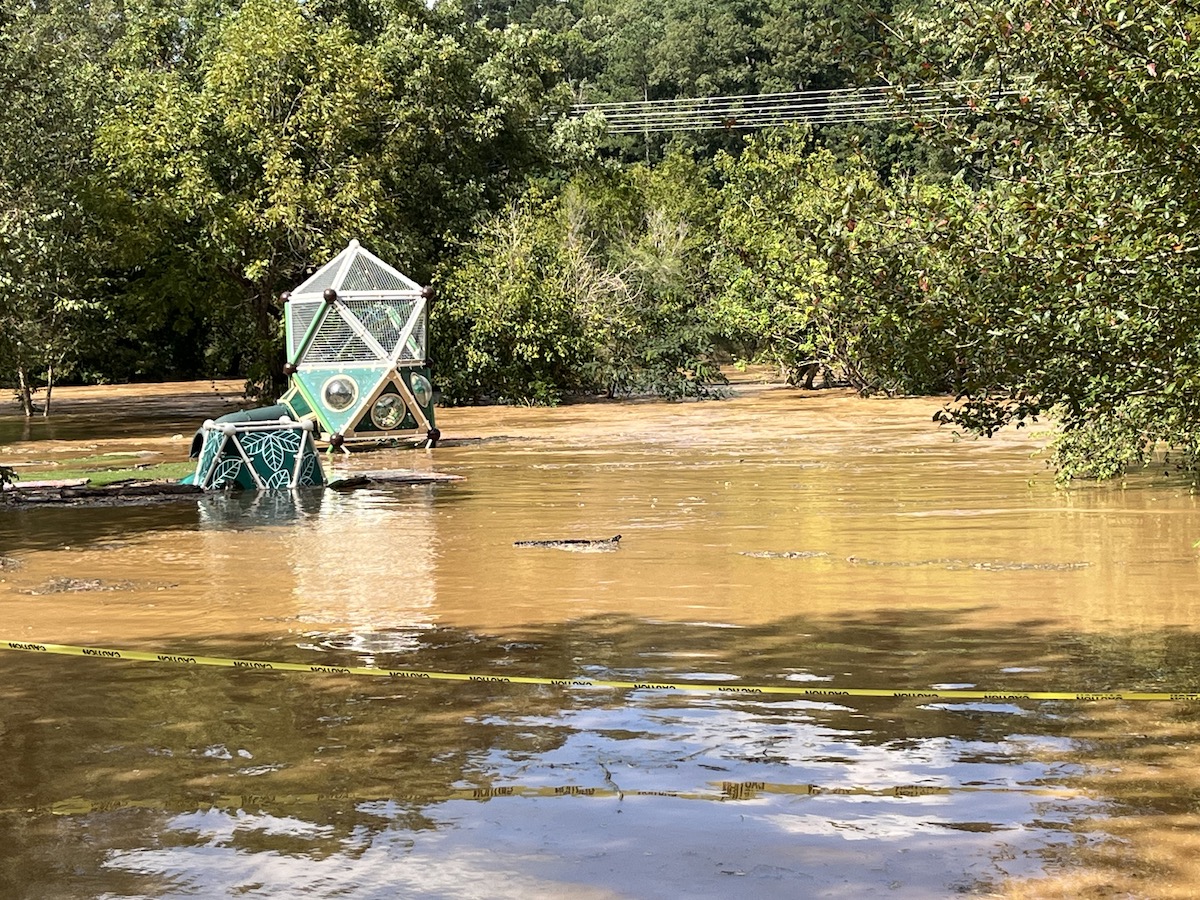
Even days after Helene struck, Lorraine Park remained underwater, with some playground equipment totally submerged.
“The scouring at Panola Shoals took out so much of the sand,” said Dr. Echols. The City of Stonecrest had received permitting and started work on the launch when Helene blew through last September, scouring the banks so badly that they didn’t even look the same. “Helene caused [Stonecrest] to have to go back and do additional assessments, but they’ve got that done. Hopefully, it’ll be finished by next fall.”
While the parking lot at Panola Shoals is still closed, the trailhead and river are still accessible via the paved PATH from Lyon Farm or the MLK Jr. High School Trailhead. However, the launch at Lorraine Park remains on hiatus as the bank is quite steep there, and the previously installed floating kayak launch couldn’t withstand storm surges.
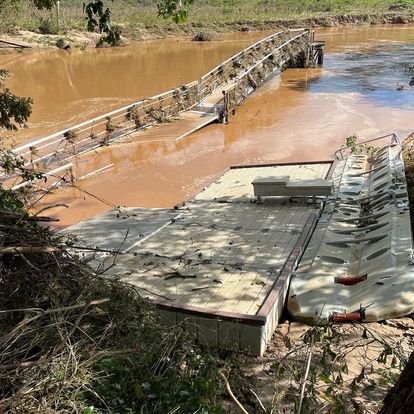
The floating kayak launch at Lorraine Park was completely destroyed Helene floodwaters.
However, there is some light at the end of the river. The launch point at River’s Bend is open once again. “The sand bar is coming back and nature is resilient,” said Dr. Echols. “And Stonecrest is also working on [a launch] at Everett Park. So, hopefully by next year, Everett and Lorraine will be both back online. I’ve got my fingers crossed.”
History of Mistreatment
Just north of the world’s busiest airport are the headwaters of the South River, a quiet and slowly flowing tributary making its way south for 60 miles until it empties into Jackson Lake in Butts, Jasper and Newton Counties where it becomes the Ocmulgee River. Often overshadowed by Atlanta’s better-known Chattahoochee River, the South River serves as a natural escape for a different part of the metro area. Flowing through densely populated, suburban and rural areas, the South River provides tranquility in an ever urbanizing world.
Unfortunately, this river has faced a long history of pollution and contamination, mistreatment and neglect caused by a lack of enforcement of environmental protection standards and continuously broken promises by local governments. While rivers are supposed to rise some during heavy storms or flooding, the South River rising 12 or more feet is not natural and is the result of too much stormwater run-off from pavement and impermeable services throughout the metro area. In short, all that run-off from metro Atlanta has to go somewhere and the vast majority of it winds up in the South River.
Related to this problem is pollution in the river. Stormwater runoff brings with it litter and pollution wash downed stream into the South River and, ultimately, to the Atlantic. Another unfortunately common problem is iIllegal dumping due to a lack of environmental education and awareness and as a way to avoid paying disposal fees. Lack of official policies have also been a large contributing factor to the poor cleanliness and quality of the river.
Founded in 2000, the South River Watershed Alliance is the only organization fighting to protect this waterway. Pollution of the river from Atlanta and DeKalb County goes back decades. As a woman of color, Echols was particularly aware of the ways Black and minority communities were impacted most by the environmental neglect. She first got involved in protecting the South River as a volunteer in the late ’90s during a federal consent decree to clean up pollution from Atlanta’s sewage overflow problems.
In 2010, DeKalb County was sued by the United States Environmental Protection Agency (EPA) and the Georgia Department of Natural Resources (DNR) for its violation of the Clean Water Act, alleging that the county had been allowing sewage spills into the Chattahoochee and South Rivers. After a lengthy battle with the EPA, Echols and other environmentalists succeeded in reducing the number of sewer discharges from Atlanta’s combined sewer system into the river from 4 to 1. Because of the improved water quality, it’s once again safe to recreate on the South River in tubes, kayaks or canoes. However, Echols never foresaw flooding levels to become such barrier to river access and the creation of a bigger South River Water Trail.
Rising Awareness
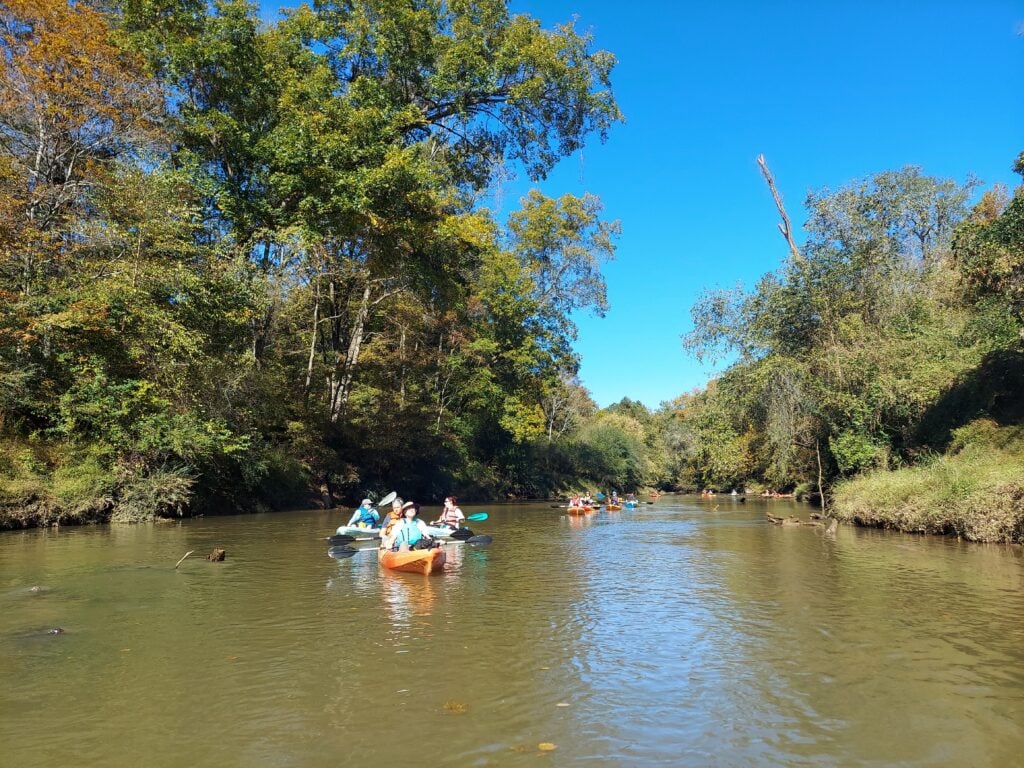
The Georgia Beloved Naturalist 2023 cohort ended their season with a celebratory paddle down the South River, launching at Panola Shoals.
Although many who live right next door aren’t aware of its existence, the South River has been drawing some attention recently and in turn awareness around its problems have also been on the rise. With significant improvements to its water quality in recent years, county governments have been working towards the installation of a kayak/canoe launches as well as renovating Panola Shoals to encourage paddle launches.
Focus on other sites long the river have also been bringing the it closer to the spotlight, such as a new trail system at a South River overlook at Everett Park funded by a grant from Bobcat and in partnership with the National Recreation and Parks Association (NRPA) which was grandly unveiled at a ceremony in November 2023. The ceremony drew in City of Stonecrest officials and members of NRPA, Bobcat, the SRWA and the Arabia Alliance, as well as members of the public.
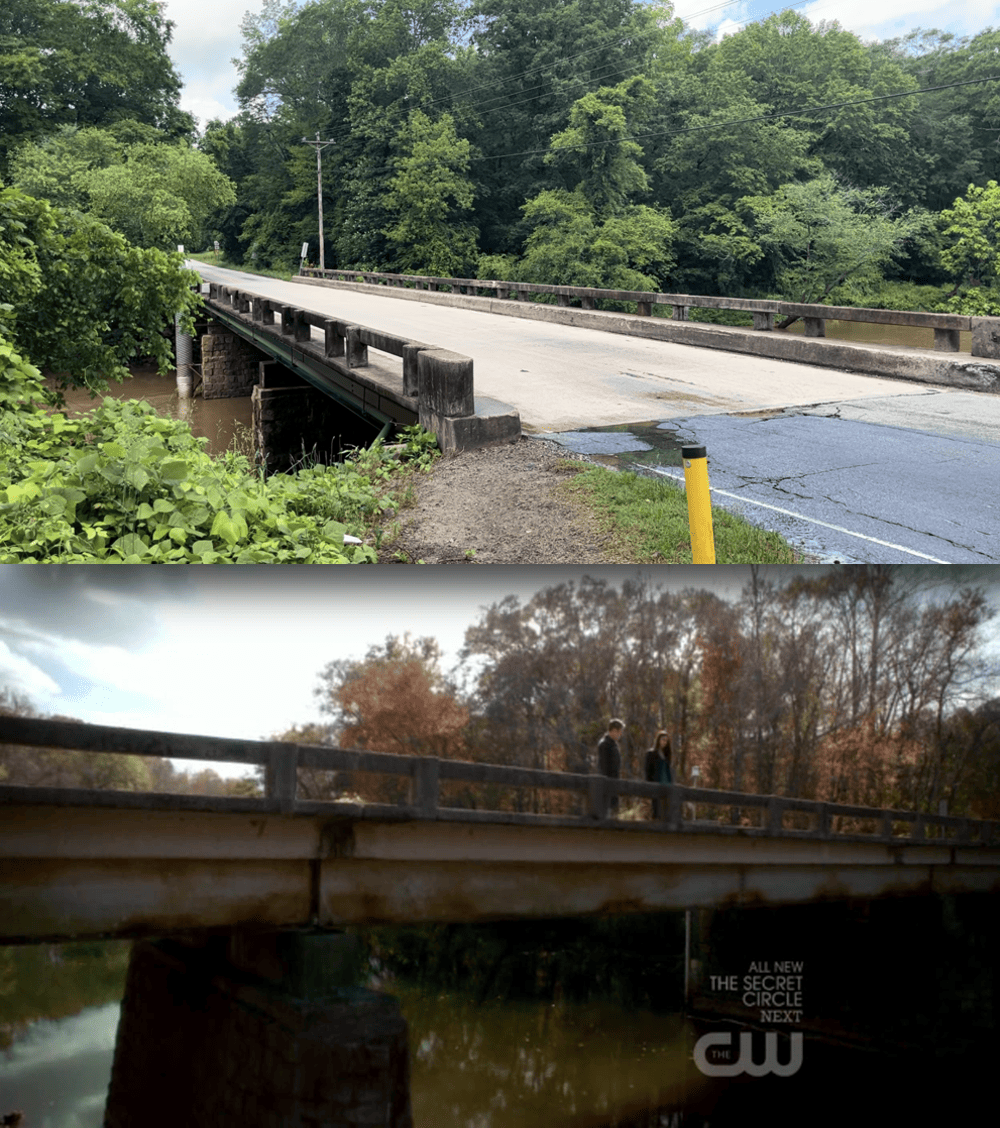
Top: The Klondike Rd-South River bridge as seen at Everett Park. Bottom: A scene from The Vampire Diaries depicting the bridge (representing the Wickery Bridge in the show) with the South River seen flowing underneath.
Another Everett Park area attraction giving the river attention has been a particular bridge that appeared in the hit CW series The Vampire Diaries – specifically the Klondike Rd bridge that crosses the South River at Everett Park. Fans flock from around the county, and even the world, to see and take pictures at the bridge.
What’s Next for the South River?
While the paddling season had to be cancelled this year due to a lack of launch points, Dr. Echols said they will be ready for a robust paddling season for summer 2026. In the meantime, the South River Watershed Alliance has been focusing on other offerings, such as an Advocacy Film Series screening documentaries about the South River or about similar struggles across the country. The next free screening is Return of the River (about Washington State’s Elwha River) at Agnes Scott College on September 28 from 2-5pm. The nonprofit is also offering an Overnight on the Ocmulgee paddle and camp from September 12-13 with an overnight stay at Towaliga River Retreat campground and a 10-mile guided paddle to Popes Ferry Landing the following day.
In addition to this, Dr. Echols is still planning an annual river cleanup at Panola Mountain State Park on October 4 (rain date on the 18) with a put-in likely near Lyon Farm. “We’re darned determined we’re going to do something this year about those tires,” said Dr. Echols. “The hardest thing is finding a municipality that will recycle the tires.”
With a few more volunteers as dedicated as Dr. Echols, who knows, the South River could be the next Chattahoochee.
______________________________________________________________________________
The South River Watershed Alliance is celebrating its 25th year. Please consider a donation.